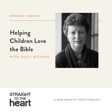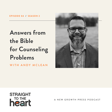Introduction and Podcast Focus
00:00:01
Speaker
The goal is not to produce little systematic theologians in the youth room. We teach theologically because we want to make Christians.
00:00:15
Speaker
I'm Rush Witt and you're listening to Season 3 of Straight to the Heart, a podcast from New Growth Press. Each episode includes thought-provoking conversations with leading Christian writers and thinkers. We hear who they are, what they believe, how they approach their work in ministry, and the moments in people who have changed their lives.
00:00:35
Speaker
In Straight to the Heart, we go beyond the books to connect with the remarkable people behind them.
Youth Ministry and Theology
00:00:41
Speaker
Today's episode is unique because it's about youth ministry, and more specifically, it's about theologically driven youth ministry. Mike McGarry is the founder and director of Youth Pastor Theologian. He served as a youth pastor for 18 years and has two youth at home.
00:00:59
Speaker
Mike is the author of Discover, Questioning Your Way to Faith, Lead Them to Jesus, and a biblical theology of youth ministry.
00:01:08
Speaker
Mike and I discuss some of the friends and enemies of theologically minded youth ministry, the importance of team-based ministry among students, Mike's advice to new green youth ministry leaders, and more. Listen and be encouraged. And if you know a youth pastor or leader who is striving to serve the church faithfully, share the episode. This is Straight to the Heart.
00:01:33
Speaker
Mike McGarry, thank you for being my guest on the podcast today. I'm really looking forward to talking with you about youth ministry. Hey, thanks so much for having me on. Looking forward to it too.
00:01:45
Speaker
Yeah, a quick story to start.
Mike McGarry's Journey
00:01:48
Speaker
So the first kind of ministry position that I had was under a youth pastor named Kevin Hall, and this was in Kentucky. And I kind of entered ministry, I think like a lot of people do, you know, in a youth ministry associate or assistant kind of position. But one of the interesting things that I think you'll appreciate is that Kevin Hall
00:02:09
Speaker
was, in my view, a unique youth pastor because he was a youth pastor for life. And it wasn't like youth ministry was the starting point for him, and then he was going to graduate later. Something still in ministry. Yeah. And that really made a big difference in me and a number of other people that he mentored and poured into. It was just a different thing than we were used to. Awesome.
00:02:35
Speaker
Awesome. Kevin's the goat. Yeah. We need those long-term veteran youth pastors who, who stay in youth ministry, even though they can do other things. Exactly. And so, well, I wonder what, what, what's your story in terms of youth ministry and how you've come to this point in ministry life? Well, um, I grew up in church. Um, I was that,
00:03:04
Speaker
church kid in Sunday school who either knew all the answers in Sunday school class or he knew enough about the Bible to make up answers that sounded plausible unless you actually knew the answer. That was my
00:03:20
Speaker
That was me. I was that obnoxious kid. So I like to joke that I was predestined for seminary. So I grew up in church and I really don't remember not being a Christian. And so for me, I have one of those fortunate testimonies of
00:03:43
Speaker
Yeah, thanking the Lord for what he guarded me against. But, you know, life did what life sometimes does and kind of blew up when I was about 12 years old and my parents divorced and it was a pretty messy
00:04:01
Speaker
difficult situation. I'm the youngest of four. So my two oldest siblings were out of the house and my brother and I were still home. And I was just heading into those teen years and now dad's not home. And my church had just called a new youth pastor right around that time.
00:04:23
Speaker
And man, was he old. He was like the most ancient youth pastor. Why would church ever hire someone who's in his late thirties to be a youth pastor? I'm like, Oh man, now I'm looking back. I'm like, Oh, he was so young. Um, but as a teenager, uh, you kind of just think like, what old youth pastor, what, what's up with that? But man, I am so thankful for Craig Secor and for his ministry, uh, for the way that he really stepped in.
00:04:53
Speaker
and cared for me and for my family during some really difficult years. The way he spoke the truth of the gospel to a kid who was just
00:05:06
Speaker
drowning but trying to hold it together. And so yeah, during my junior year, he started giving me opportunities to teach in Bible study and youth group. And I was a super socially awkward kid with a stutter
00:05:24
Speaker
and who would turn beat beat red. Whenever I would talk in front of people, I am the least likely person to have become a youth pastor if you knew me as a teenager. Oh yeah, it was painfully awkward.
00:05:38
Speaker
Um, I still am sometimes. Um, but yeah, my, um, I actually had breakfast with him not too long ago, uh, when he was back up in the area and he kind of jokingly, uh, was like, Mike, I still just shake my head and say, I can't believe.
00:05:59
Speaker
that you're doing what you're doing. Because when you told me that you wanted to go to Gordon College to study Youth Ministry, I just said, well, I mean, this is clearly the Lord's doing because it's not your natural gifting.
00:06:15
Speaker
So I'm not getting in the way of it and I'm going to support you in that calling however I can, but you are not naturally gifted for this. This is the Lord's favor. So yeah, sometimes God just calls you and equips you in some surprising ways.
Transition to Youth Pastor Theologian
00:06:32
Speaker
And over the course of the last 20-ish years, whenever
00:06:39
Speaker
Whenever I've had opportunities to do other ministry, I really had no desire to leave youth ministry. And the times when I wanted to leave youth ministry, there were no opportunities. So I was a youth pastor for 18 years until just about six months ago, when I rolled off of church staff to be able to lead my current ministry, youth pastor, theologian, as my full-time ministry, essentially as a pastor to youth pastors.
00:07:08
Speaker
Yeah, so tell me about Youth Pastor Theologian. I really love the title of your ministry because it obviously is speaking into something that is sometimes either stereotypically thought to be neglected in youth ministry and obviously is of utmost importance. So tell me about your ministry. Yeah, well, I...
00:07:36
Speaker
I always felt a bit of an odd duck and never really like I fit in among other youth pastors because I was just a theology geek. I hope not a Theo bro, but a theology geek and just I love asking the hard and sometimes uncomfortable questions and
00:08:01
Speaker
Yeah, I just want to be really deliberate about like, how are we building our ministries on a biblical foundation? Like, how can we really think biblically and theologically about what is youth ministry? I think those are really important, but often neglected questions. And so really digging into that and then translating sound doctrine in a way that is understandable to teenagers.
00:08:26
Speaker
but also is applicable to teenagers so they can see like why does any of this matter right what like what is the point.
00:08:34
Speaker
Um, and so eventually there really wasn't any space really focused deeply on that. There were a few organizations, you know, doing some of it, but not as their singular focus. Um, and increasingly it just felt the Lord leading me to start a blog.
00:08:57
Speaker
Um, about, you know, those two core questions, what is youth ministry and how can we teach theologically with confidence? Um, and that blog just kind of grew, um, and kind of internationally even, which is really surprising and, uh, definitely not was anything that I had planned or orchestrated.
00:09:18
Speaker
And so it kind of just grew to the point that I couldn't continue to lead that website and that also, you know,
00:09:29
Speaker
we had our own podcast too, I couldn't do those things while still being a full-time youth pastor. And so it was either I need to shut it all down or I actually need to just trust the Lord and do this and trust Him to provide because there's really not anything that we're doing that brings in money. So it's all fundraised. Years ago, I told the Lord, I will serve you in ministry, but I'm not doing a fundraised ministry. And you know,
00:09:58
Speaker
man plans, God laughs. And the Lord is providing, but we still need donors, we still need churches and organizations to help support, but God is doing something. And yeah, it's really, really exciting. So the name is a funny story. I didn't really know what, like, what do I make this, right? Like, what do I call this thing?
00:10:27
Speaker
And I thought back to my Twitter bio at one point, and I mean, years ago when I started Twitter, in my bio, I put... That's what you called yourself. Wow. Yeah. Yeah. So I went to seminary Gordon Conwell, and Gordon Conwell is real big. They've always been really big on the pastor scholar, on the pastor theologian. And so really talking about we train pastor theologians.
00:10:53
Speaker
So when I joined Twitter, I put pastor theologian and I was like, well, I'm a youth pastor. So I just put youth pastor theologian in my Twitter bio, like a decade ago. So I was thinking about what do I call this website? And something just sparked my Twitter bio. And I was like, oh, that's a great title. Yeah. So here we are. It really is a fantastic. Yeah, for sure. X. X. Elon. Yeah, that's a great title.
Balancing Fun and Theology in Ministry
00:11:22
Speaker
And, you know, it seems as I think about it, it seems as though in youth ministry, there's two ends or, you know, maybe to the spectrum on one end in certain places. Youth ministry is really a prominent ministry, but it's not thought of very theologically. And then on the other end, there can be maybe a mindset that's so theological that it even raises the question, is youth ministry even biblical? And so I wonder on that end of the spectrum, how you would answer that question.
00:11:51
Speaker
Yeah, I think it's a really important question and it's a totally valid question.
00:11:56
Speaker
I remember the first time I was really kind of approached kind of aggressively by someone who's associated with the family-integrated church movement about 10 years ago about that. And they'd been reading a lot of Vadi Bakom. And so they said, this isn't even biblical. It's nowhere in scripture. Why are we even doing this? We're contributing to the problem. Of course, kids are dropping out. We're not training parents to do it. We're doing it for them. So what are we even doing?
00:12:26
Speaker
Um, okay. Okay. Calm down. Fair questions. But I think sometimes the question is asked with a tone, um, that makes youth pastors not want to engage the question. Um, so sometimes the aggression.
00:12:44
Speaker
is actually counterproductive. And I'm all for the question. I'm all for the conversation. And that really is what my first book was about. So my first book is called The Biblical Theology of Youth Ministry and goes through an exegetical historical and theological foundation for the way God's people have always passed the faith
00:13:06
Speaker
from generation to generation. And so if you're looking for modern youth ministry with Sunday school and youth groups that meet on Wednesdays,
00:13:19
Speaker
and full-time youth pastors. Yeah, I mean, that's new. That's 120 years old-ish, give or take. But youth ministry, biblically conceived as the partnership between the people of God and the family in that co-partnership, that co-evangelism, co-discipleship of the next generation,
00:13:47
Speaker
that has always existed. We see that all the way back in Deuteronomy 6 is the foundational passage that pretty much every family pastor, children's pastor, that's the passage. And one of the things that people often forget about that passage, about parents to engrave the commandments of the Lord on your children's hearts,
00:14:12
Speaker
People forget that was given in the context of, here, O Israel, the Lord our God, the Lord is one. And then it immediately follows up with, engrave these commandments on your children's hearts, right? So it's given to Israel, not just to isolated parents,
00:14:29
Speaker
And I think it's also essential to point out the nuclear family literally did not exist. Um, that there was no mom, dad, children living completely separately from the rest of the family clan. Like they lived in family compounds. They lived with a multi-generational situation. Um, and so everything was intergenerational ministry.
00:14:58
Speaker
Everything was community ministry. So if you really want to have a hard reading of that passage, then quit your job, buy a big plot of land, and make sure that all of your multi-generational family is living there.
00:15:16
Speaker
then you can have a hard reading of Deuteronomy 6. But if you're not doing that, then don't try giving a hard reading of Deuteronomy 6 at me and say, youth ministry is unbiblical, if you're only going to take that to apply to the nuclear family, which is not a biblical conception. There's a ton of other passages throughout scripture that I dig into in a biblical theology of youth ministry. But if we say that the church is the family of God,
00:15:44
Speaker
and we actually mean that, then that means every kid in the church
00:15:51
Speaker
is part of our church family and we share a responsibility, a Deuteronomy 6 responsibility and calling to minister and disciple those kids. And if we don't mean that as a church and we're just going to pass it on to the family and say, you do it, family, parents, it's your responsibility, it's not our responsibility, then stop baptizing your kids and stop dedicating them and making vows if you don't mean it.
00:16:21
Speaker
Do you feel overwhelmed with the logistics of starting or keeping a youth ministry going? What about the tricky theological questions that keep you and your fellow youth workers on your toes? It's a lot for what is usually an all-volunteer army.
00:16:37
Speaker
Help is here. Veteran youth pastor Mike McGarry offers a practical comprehensive tool to jumpstart your youth ministry and help youth workers with biblical answers to the tough questions students ask. Lead Them to Jesus offers insight into the religious worldview of Gen Z and illustrates how to connect the gospel to their questions and core desires.
00:17:02
Speaker
Not only are young people ready to discuss hard issues such as suicide, suffering, and navigating difficult relationships, they're looking for authentic leaders who are committed to speaking truth and investing into their lives. Learn more and order copies of Lead Them to Jesus for your church's youth workers when you visit NewGrowthPress.com.
00:17:28
Speaker
You know, Mike, I know by your area code and by a little bit of your accent that you are in Boston. And one of my almost lifelong friends, I think I mentioned this to you when we saw each other last, planted a church more than a decade ago in Medford.
00:17:47
Speaker
And so I know that Boston is a hard place to plant church, to do ministry. And so it actually brings to mind for me a question for you of what's youth ministry like in a place like Boston? You know, how effective is youth ministry and what's the culture, how does it play into the culture of where you live and serve?
00:18:10
Speaker
Yeah. So I'm not in Boston proper. Um, if I, if I was actually in the city, then I'd have an even awesome accent.
00:18:19
Speaker
I got just enough. So I'm about 35, 40 minutes south of Boston. For those who know, I live right in there, Foxborough, which is where the Patriots play. So when the Patriots have a home game, I literally have to take a different route to church because there's too much traffic. So I'm right between Boston and Providence, Rhode Island.
Challenges of Ministry in Boston
00:18:43
Speaker
So just geographically, that's where I'm at.
00:18:45
Speaker
But I mean, I grew up here. So I live in the town right next to where I grew up. The two churches that I've served in are both here as well. And I mean, youth ministries are small. It's just normal to me. I was talking with a youth pastor friend in South Carolina not long ago who was saying that they can have a pizza and dodgeball night.
00:19:14
Speaker
and still get like 100 people, 100 kids to come out and they'll actually bring their unchurched friends. And my mind was blown. I didn't think that that actually happened anywhere, anymore. I thought that hasn't happened since 1995. So that type of youth ministry
00:19:39
Speaker
cannot exist here. When you do fun game nights, and there's a place for that. Yes, the pastor theologian is actually four games, but done not to get kids to come, but to foster relationships and a gospel culture. That's another topic. But when you do a game night here,
00:20:04
Speaker
you'll get your students to come, but they will not bring friends. I think that one of the best evangelistic ministries that you can have is to actually have something meaty and meaningful, like an ask a pastor night or like an ask anything night.
00:20:23
Speaker
Um, or even to have next week's youth group, we're talking about sexuality and gender. Um, so come and bring your questions and bring your friends. And we're going to talk about some really difficult topics. And it sounds like that's the week to not bring friends.
00:20:42
Speaker
right? I mean, when I was growing up, that would be the week that you would never want to bring friends. But for where we are, these are the questions that everyone is grappling with. And for an unchurched audience, they're going to come in with assumptions that you're going to say, Oh, well, you know, God hates
00:21:01
Speaker
And so it's an opportunity for a really difficult question and conversation that is meaningful. That's something that they are asking and that they're wondering about and they're knowing that they're coming in with certain assumptions. You don't want to just blow up their assumptions to blow up their assumptions, but you want to proclaim Christ and you want to teach scripture with love and with compassion and
00:21:29
Speaker
How can we engage in those meaningful conversations? And so I think fun and games ministry does not fly here. And I think that's part of the reason why I approach student ministry the way I do, because you need to give them something worth holding on to. And if we want to call students into a faith,
00:21:58
Speaker
that's big enough for them to grow into, then we need to create space to foster meaningful and difficult conversations together. And if we refuse to talk about theology or to be uncomfortable together, then we're never going to have those conversations and kids are never going to move past the children's Bible.
00:22:24
Speaker
And then they'll say, I grew up in church my entire life. I went to youth group throughout my teen years. And now the storms of life have come. Um, suffering is here. Hard questions are here. Internal doubts are here. And my faith has nothing to say to this. Hold on to it. Yeah. Yeah. Those hard things really show that the, the world is not full of games. And I appreciate that you are,
00:22:52
Speaker
Acknowledging a youth pastor theologian is not against games or having fun. I mean, that's part of what it means to be a student or to be at the youth stage of life.
Gen Z, Cancel Culture, and Worldview
00:23:04
Speaker
But that low expectation you've described of thinking, you know, no students today are going to want to come to something and talk about deep topics. That suggests there's at least one, and I think there are many then,
00:23:19
Speaker
misunderstandings about the current generation. And I know that it's complicated. I mean, we have so many complicated things that everyone is sorting through, especially adults in terms of the current focus on, you know, maybe it's cancel culture or tolerance or, you know, all of the other social issues which are so complicated and difficult. I wonder what kind of misunderstandings do you see in
00:23:42
Speaker
in adults today that kind of might be lending themselves into that low expectation and missing some opportunities. Yeah. Yeah. I think some of it is exactly. I think a lot of it is exactly what you just said. And so I would say that you
00:23:58
Speaker
Yeah, I completely agree with you. Tolerance and cancel culture, I think, are at the heart of Gen Z's worldview. The way that I personally try to break it down for parents and for youth workers and whoever else will listen is that tolerance is the new golden rule.
00:24:18
Speaker
You do you, you be you, live your truth, these things. Tolerance is the new golden rule. And that safety is the new American dream. And that's physical safety. You think about all the school shootings and helicopter parents and everything, right? I think about emotional safety with mental health is just an absolute train wreck right now.
00:24:45
Speaker
And then you also have spiritual safety with deconstruction the church church abuse me too Yeah, and so you just think about like the trustworthiness of religious leaders has never been this low And so those things together is your youth ministry a safe space is your church a safe space? That's not weakness that that's look we should be able to to have meaningful conversations together without kids feeling
00:25:14
Speaker
like they're just going to now be marked by shame for asking a hard question. So how can we promote a view of Christian tolerance that says tolerance means respect despite disagreement, that Christian tolerance means loving your neighbor and loving your enemy? Or do we just say that tolerance is just garbage and tolerance is compromised and tolerance is weak Christianity?
00:25:43
Speaker
If that's the line you're going to take, you're not going to have any Gen Z people in your church. So will you create space for meaningful conversations and not just jump on people who say unbiblical things, but to allow the wrestle, allow the conversation, allow the doubt,
00:26:11
Speaker
Um, because that's often the seed bed for the faith to grow. Um, yeah. So I think that kids want those conversations. Teenagers want those conversations. So, so, so then let me piggyback a little on what you just said, because, uh, as I hear it, I'm thinking about, especially.
00:26:33
Speaker
could be youth pastors or other church leaders or even parents that are not quite sure how to do the thing that you just said. How to engage with hard questions or how to engage when students are expressing doubt because there's this trend, this natural tendency. I see it in myself. It's a natural tendency back to
00:26:57
Speaker
like a kind of simplicity. I need to find the simplest way to answer the doubt or, or solve the problem. But that's, that's not, that's not a part of working things out the way you're describing. So I just wonder, you know, how you direct other youth pastors, church leaders, parents to, to help them see their role in that kind of difficult kind of gritty ministry with students today. Yeah. Well, I mean, the answer isn't,
00:27:27
Speaker
make things complicated. Please don't do that. There's two types of smart. There are smart people who are just so smart. They take something that you think you know and that you think is so clear and they show you how complicated it is. And then there are smart people who take things that are really complicated and confusing and explain it in a way that you go, oh, I get it now.
00:27:58
Speaker
And I think youth pastor theologians need to be the second kind of smart. They need to be the kind who understand the doctrine, the exegetical depth, the theological depth well enough that they
00:28:14
Speaker
They might not know everything about the topic, but they understand it enough and they understand their students enough that they can explain and articulate the rich and meaningful things and prompt the meaningful conversations in a way
00:28:31
Speaker
that you're not oversimplifying in a dumb it down kind of way, but that you're bringing clarity. Um, I think it's all about clarity. And, um, one of the other aspects of that is how are you dealing with the small questions and how are you dealing with the stupid questions?
00:28:56
Speaker
And if you minimize students dumb questions, they're never going to ask the hard ones.
Building Trust and Encouraging Questions
00:29:08
Speaker
And it's the same when you're leading a small group. I mean, whether you're an adult or a teenager, you know, when people share their really simple prayer quest, pray for Aunt Jenny, she has the flu. Pray for my math test.
00:29:25
Speaker
I'm really struggling. How do you respond to those? If you just brush them off like they don't matter, then when something really big happens in life, are they going to be prone to share that?
00:29:42
Speaker
But if you follow up, hey, you know, two weeks ago, you asked us to pray for your Aunt Jenny. How's she doing? Hey, how's math going? I know it's been a struggle this year. Are you doing OK? Yeah, I was really never very good at math either. You know, hang in there. You'll get it. Just don't give up.
00:30:01
Speaker
Right. So you're acknowledging that you care about them enough that you're listening to what could be and probably is a bit of a throwaway thing just to fill time. You got to say something. So I'll say something that keeps you at arm's length. But in time that builds and cultivates trust so that now, you know, life is getting really neat. You know, I've been arguing with my parents a lot lately and things have been pretty tough at home. Right. So now, now we're getting somewhere.
00:30:31
Speaker
Yeah, I think that parents, I'm a parent of five, and a few of them are teenagers. And as a parent and also as a pastor, I think that there's a real need to do what you're talking about. There's a need in being patient.
00:30:52
Speaker
And it just is going to require patience that sometimes we're not maybe eager to give or maybe we don't anticipate. I mean, I'm even thinking recently about my son who is 15 and a half and he's kind of broken in. And the last, it's interesting to see the way, you know, the kids change and suddenly something shifts or clicks and he's kind of focused in on reading some heavier
00:31:16
Speaker
books. And and so what that has meant is he's asking now he has iPhones and he's and he's good at looking up words he doesn't know. And that's really been encouragement to me. Awesome. But he's also asking that he's asking those a lot. What does this mean? What does that word mean? What does this and I just am kind of reminding myself this is exactly what you want happening. Yeah. And so you got to lean into this with patience and and just be happy. It's not foolish to ask questions about words. You know, everybody's learning in that way. So yeah.
00:31:47
Speaker
Yeah, and that's why I wrote Discover, questioning your rate of faith, published with New Growth Press. That's why I wrote it, because teenagers have meaningful, rich theological questions. And some of them are going to come direct.
00:32:05
Speaker
at you that are mostly about like creation evolution and gender and sexuality and things like that are you know and the suffering and the hell question a lot of questions come sideways about like how do we know that our faith is is the true faith and right that's actually a question about the about the doctrine of the trinity right and
00:32:30
Speaker
the sufficiency of Christ. There are a lot of theological questions that come direct, and there are a lot that come sideways, that are questions that I addressed in the book, so there's 20 of them in the book.
00:32:46
Speaker
Some of them you will hear students ask the way that I have them as chapter titles. Some of them you will never hear a teenager ask the question the way that I have that chapter title named. But when you show the table of contents to a teenager, they will say, yeah, I'm curious about every single one of those.
00:33:06
Speaker
because the ones that they won't ask straight up are the sideways questions. And so it's been a really fun and interesting thing to hear from parents who are reading the book with their kids and from youth pastors who are having small groups or Sunday school classes with the book. And yeah, I've just in my 20 years of ministry and I have two teenagers at home myself now too. And it's been really fun to
00:33:35
Speaker
to kind of poke and put those questions out in front. I want you to know something. It's okay for you to have questions about your faith. You aren't the only one that has those questions, and you shouldn't be embarrassed by them. In Discover, Questioning Your Way to Faith, Mike McGarry explores the 20 most common questions teenagers ask. Mike wants you to see your questions as an opportunity to dig deeper and grow in your faith.
00:34:05
Speaker
Each chapter is short and tackles important topics such as doubt, the resurrection, tolerance, sexual issues, prayer, and more. He thinks you'll be encouraged to see what God has to say, and I do too. Discover Questioning Your Way to Faith is available now at NewGrowthPress.com.
00:34:25
Speaker
I'm going to run the risk of being a bad conversation partner and ask kind of a complicated question. And that is when it comes to youth ministry and theologically mindful youth ministry, what do you think are a couple enemies of that kind of ministry? And what do you think are a couple really good friends that
00:34:45
Speaker
You may be youth, youth ministry leaders, pastors, even parents might be overlooking on both sides. They don't see the enemies there that are holding back and they may not see the friends. They should be engaging with, you know, the friends of youth of this kind of youth ministry. Awesome. I love it. And you can take a minute and I'll, I'll add it. I'm good. I got, I got this. So I would say that funny games are not the enemy.
00:35:11
Speaker
Right? And so it is really, really hard to love someone who you cannot laugh with. If you cannot throw a dodge ball at each other, then why should you expect meaningful prayer requests around a small group table when the kids clearly don't like each other? And when students complain that youth group isn't fun,
00:35:41
Speaker
They're not actually complaining about the games. They're complaining about the people. They're complaining about the culture. Because I don't know about you, Rush, but for me, I have done some really stupid things with people who I love. And it has been a blast. And I've done some really awesome things with people who I just don't enjoy and you could not pay me enough to do that thing again with them.
00:36:10
Speaker
It's not about the fun. So when kids are complaining about, oh, youth group's not fun. I don't want to go there. It's too boring. It's not about the fun. It's not about the games. It's about the people. It's about the culture. Like what is the gospel culture of your church and of your ministry? What is the tone? How do people treat one another? How do the leaders treat the students? How do the students treat each other?
00:36:40
Speaker
And so I think that service projects and games are the two best ways for you to establish and guard the ministry culture. So that way they are intentionally playing together. It's not about playing the most fun game in the world. That has not ever been my goal as a youth pastor. So when kids complain that the game isn't fun enough,
00:37:11
Speaker
You know what, if the kids were engaging with each other and they were playing with each other and we deliberately
00:37:18
Speaker
split up teams so that you're not just playing with all of your best friends, uh, so that everyone has a friend on their team, but you're also playing with other people who you don't normally engage with. And Hey, guess what? Now you're on a team. So their success is your success. What's going to happen now, all of a sudden you're rooting for each other when you normally have nothing else to do with each other. Um, right. So that,
00:37:47
Speaker
the fun and games can actually be part of the discipleship process in your ministry by being deliberate about it. Now, on the other side of things, an obsession with fun and games is the enemy. And my friend Kyle Hossmith put it this way in a conversation once. He said, if you never do, if you'll only do fun things in your ministry, then you will never make disciples.
00:38:17
Speaker
I don't remember exactly how he said it, but that's my version of what he said. That's a good version. Really wise, right? So if you will only do fun things, you will never make disciples because sometimes some meaningful Bible study, hey, that's just not super fun, right?
Balancing Fun and Discipleship
00:38:36
Speaker
You can do a lot of things that are more fun than have Bible study. So if fun always needs to be not just present, but the priority,
00:38:49
Speaker
then you will never do really important things in your ministry that you need to do in order to give kids lasting faith. If you want to be a youth pastor or a theologian, and I hope you do, then you need to think theologically about
00:39:11
Speaker
the Great Commission about evangelism, about discipleship, about just practical ministry practice, and not just be reactive. So we don't just keep doing what we did as teenagers, but we also don't just rebel and react against.
00:39:29
Speaker
what we experienced as teenagers. We want to be thoughtful. The goal is not to produce little systematic theologians in the youth room. We teach theologically because we want to make Christians. And how many kids are graduating from our church's youth ministries, and they've literally never discussed something as important as the Trinity.
00:39:58
Speaker
I mean, it's who God is. So this isn't to say like they need to understand like hypostatic union and like, right? Prose upon. And you know, that's like, they don't need the Latin bike. They don't need all of the heavy, deep, nerdy stuff that you might be interested in as the youth pastor who's in seminary, like, but they should understand some aspects of
00:40:25
Speaker
the three in one nature of who God is as the distinctive element
00:40:30
Speaker
of what Christians believe about God. This is what makes Christianity truly unique, as opposed to Islam and Judaism, who both profess to worship the same God, right? So do we worship the same God? And we say, well, we worship God who's three in one, do they? Okay, so how do we address the question? So it's just, these are,
00:41:00
Speaker
These are things that have to do with just basic Christianity and understanding the Apostles Creed and what it actually means for us to profess it. So I'm not trying to say, hey, like let's teach systematic theology in our youth rooms. I'm saying we should at least be teaching Christianity.
00:41:18
Speaker
in our youth rooms. I think you're making that very clear that students do not need seminary, but they need the church, and that's what the church does. The church makes disciples, and that's an important point. Mike, you're like a lot of guests on this podcast. You're the kind of person that I could talk to for hours. Now, we don't have hours, unfortunately, so maybe a couple more questions
00:41:44
Speaker
Yeah, so I'm a good Baptist and the way I've always approached my student leadership team is to view them essentially as the elder board for the student ministry. So as the youth pastor, I am vocationally called to lead and shepherd the student ministry and the teenagers and their parents and also the volunteers.
Team Dynamics and Volunteer Support
00:42:08
Speaker
Um, so how am I equipping them? How am I training them? How am I supporting them? But also am I trusting them? Um, and there are, there are times when I frankly have wanted to do XYZ, uh, and my youth leaders weren't on board and they essentially outvoted me and said, we really don't think that's a good idea. Um, and I trusted them.
00:42:38
Speaker
and did not do that thing, and they were right. And I can count, I can only count maybe one or two things that come to mind when I wanted to do something and they said no, and I still wish that we did it.
00:42:55
Speaker
So in nearly 20 years, to be able to count just a few, and more often than not, the wisdom of my volunteer team was spot on and very reliable. And there were very few times when I ever pulled the pastor card to say, this is what we're doing. And some of those times did not work out so great. And I wish I didn't do that. And I wish I did trust them and listen to them.
00:43:26
Speaker
And so I really would recommend honor your youth leaders, honor their wisdom, especially if they've been serving in the ministry for some time. And if you are constantly cycling through youth leaders, then maybe ask some hard questions about your leadership. And is there something, are you expecting too much?
00:43:54
Speaker
that you're burning them out, are you expecting too little? So they feel like, why am I even here? What am I even doing? Is there something about your personality and leadership style that is burning them up or cutting them up? So you want to be a good leader.
00:44:14
Speaker
of your volunteers and you want to trust them. I really am so thankful for the volunteer teams that I've served with. I think it's really important to highlight like, yeah, your leaders don't work for you. You serve together.
00:44:35
Speaker
Yeah, you're describing a culture of youth ministry that I think is unique and immeasurably valuable because the youth pastor theologian culture, if we can put it that way, is the very thing that equips these volunteer teams to be trustworthy so that you can rely on their input.
00:44:57
Speaker
And because you're then, everybody's operating out of that same culture. And that's, I think it's just invaluable for the team aspect of ministry. Yeah. And again, another book plug. This is why I wrote Lead Them to Jesus. It's a handbook for youth leaders. And when I started at my most recent church, I was coming in as the new guy and had a
00:45:27
Speaker
I, what I learned the hard way is sometimes when you talk about gospel centered ministry and gospel, this and God, it can be really confusing because who's going to say, no, I'm not gospel centered or I don't think that's important. Right. So what does it mean? And it's just, you can have the same vocabulary as your volunteers, but be using a very different dictionary and what you mean by these things are very different. And then not all of a sudden you're really surprised.
00:45:56
Speaker
there's a problem going on when you thought that you had agreed. And so I made a list of topics that I wanted to go through with my new volunteer team of important conversations that I think would be valuable for us to make sure that we're actually on the same page together.
00:46:13
Speaker
The next thing I knew, there was just way too many topics for like, yeah, it would have been enough for three years worth of team meetings. But I realized that it's a pretty good table of contents for a book. And so Lead Them to Jesus has 40 chapters, but each chapter is basically a blog length chapter. So that way your volunteers will actually read
00:46:40
Speaker
the book, the chapters, because they're, you know, three, four, sometimes five pages, but usually about four pages. So it's very accessible for you to be able to read, choose one or two chapters per month, and then discuss them in a monthly team meeting is what I recommend. And yeah, I just think how are we giving good resources and clear training
00:47:09
Speaker
for our leaders so they know what is expected, so they know what are you asking for them, how do you want things done, and how is the gospel at the heart of everything in your ministry? Like even what we just discussed earlier about fun and games, right? There's a chapter on fun and games.
00:47:28
Speaker
Do our volunteers understand the proper role of funding games in our ministry? Do our leaders understand how do you discipline a student who is just being completely obnoxious? Their ADHD meds have obviously worn off and they're just wild. Super distracting. How do we respond?
00:47:52
Speaker
How does the gospel shape the way we respond? And so just these really practical issues in that book. I just think it's important. If you're going to have volunteers and you're going to trust them, you also want to train them. Absolutely. And fantastic resource. And I'm glad that you
00:48:09
Speaker
have mentioned it and that helps anybody listening to know what they are going to be able to utilize and how they could use it. I think that's wonderful. And I am compelled maybe to ask one more question to give some direction to the young, whether that's kind of young in age or young in ministry youth pastor who might be, you know, I'm thinking of the guy that has gotten involved in youth ministries, a lot of energy.
00:48:38
Speaker
He is good with students and he's just breaking in to realize that there is something like a youth pastor theologian, but he doesn't know how to start or how to grow in
Advice for New Youth Pastors
00:48:50
Speaker
that. What would be your first two steps direction to this young guy? I would say keep it simple and be patient with yourself.
00:49:03
Speaker
You want to think big, but start small. In the end, pastoral ministry is not complicated. It's not easy, but it's not complicated. Preach the Bible. Pray for students and with students. Teach them to read the Bible. Teach them how to pray.
00:49:34
Speaker
If you're doing those things, you're doing really well. Get to know the parents' names and spend time investing in the parents, not just the kids, and build a team of other men and women.
00:49:55
Speaker
from your church who are godly men and women, not just super exciting, don't just go by charisma, go by maturity and wisdom. If all you're doing is teaching kids how to read the Bible and to pray, man, that lights out.
00:50:19
Speaker
I know that that is so encouraging and that encouragement is really needed. Mike, I want lots of youth pastors and parents and churches to know about Youth Pastor Theologian. What's the best way for them to learn more about it, get in touch, to help you? The best way to connect with Youth Pastor Theologian is to just go to the website. I know it's a long
00:50:43
Speaker
It's a long name to type, especially on a phone, but it's memorable, right? It's just youthpastortheologian.com. I tried buying ypt.com, but you know, it's owned by someone in China who's not selling.
00:50:57
Speaker
So YouthPastorTheologian.com, just go to the website and hit the subscribe button at the top. That'll just get all of our new content sent to your inbox. We don't spam you, but you'll get a few emails a week with our new articles. And that'll also get you access to our free ebook. That's a collection of articles from the archives on the website.
00:51:25
Speaker
So it'll be a kind of curated way to get up to speed on what we're trying to do with Youth Pastor Theologian. You can follow us on social media at Youth Theologian. We have a podcast. If you search the Youth Pastor Theologian podcast on any podcasting platform, you can find us there. And yeah, those are the main channels and I'm pretty available. My email's on the website. If there's some way that I can
00:51:55
Speaker
encourage or support you in your ministry. Happy to do that and try to connect. Fantastic. Mike McGarry, thank you for this conversation. Thanks for having it. Thank you for listening to this episode of Straight to the Heart. Would you do me a favor? If you
00:52:15
Speaker
Would you rate the podcast? It helps us reach more listeners. It doesn't matter where you listen. Spotify, Apple podcasts, YouTube, wherever. Rating and liking the podcast helps. And if you'd like to learn more about past seasons of our podcast, you can visit newgrowthpress.com forward slash podcast. Our next episode will appear next week, wherever you get your podcasts.




















